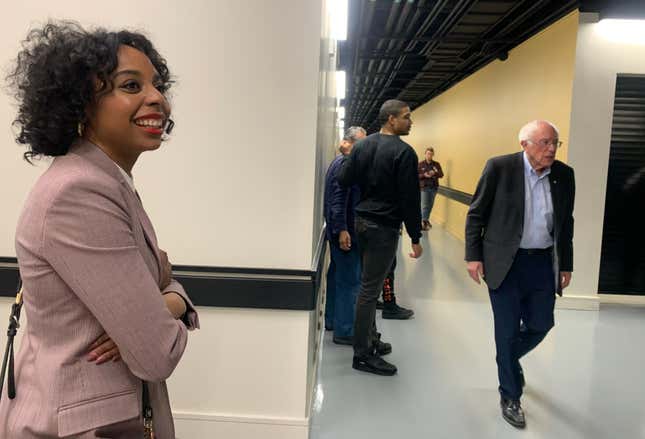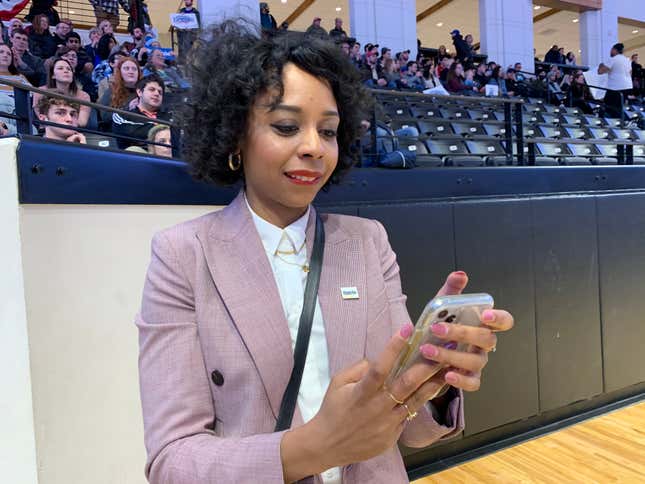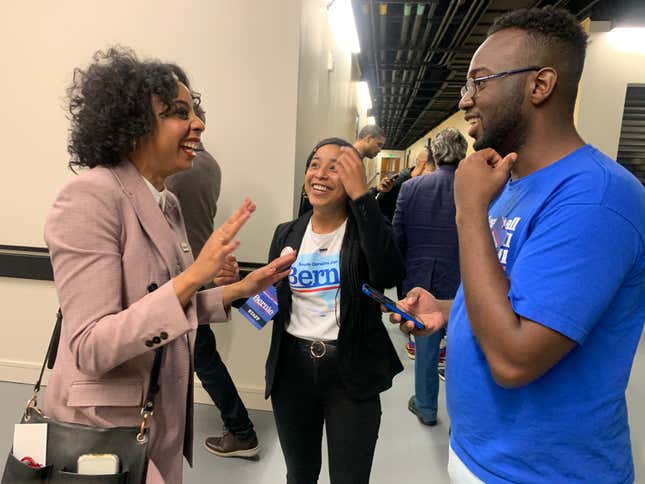
SPARTANBURG, S.C.—There are few political operatives who have turned the role of national press secretary on its head like Briahna Joy Gray. As Bernie Sanders’ top messenger, she speaks for the senator in ways he often can’t articulate himself. More directly, she not only speaks for the campaign, she defends his political revolution.
I call her the Bernie Whisperer.
If you don’t see her on television or a radio show talking about the need for Americans to divest from neoliberal politics in favor of the Democratic Socialism her candidate favors, she is on Twitter sparring with critics or amplifying the messages of Sanders’ supporters. In her role, Gray is as much a cheerleader and activist as she is a national press secretary.
She has to be.
The campaign is bracing for the reality that Sanders’ pathway to the Democratic nomination is growing slimmer. The coronavirus pandemic has stalled Sanders’ rallies—signature galvanizers of his campaign. For now, Gray told me Sanders is not dropping out and it is her job to vigorously spell out what a Joe Biden Democratic nomination will look like—which, in her words, is a loss to Donald Trump in November.
All of those black people who backed Biden will suffer another four more years, she worries. Even as her boss has failed to win over consequential black support, Gray has never wavered in promoting him. When I caught up with her several weeks ago backstage at a rally at Wofford College in Spartanburg, S.C., Sanders was ahead of Biden in delegate count and hoped to deliver a decent showing in the Palmetto State. Not only did Biden win South Carolina easily, the former VP later swept the South on Super Tuesday and garnered a lion’s share of the black vote. One of the responsibilities Gray feels she has is to help articulate to black people why Sanders will move them along economically in ways that Biden can’t.
As Sanders delivered his stump speech, Gray and I spoke backstage, where she told me about her own frustrations with American capitalism and why she feels a Sanders presidency will better help the older black folks who are devoted to Biden. Soon after graduating from Harvard Law in 2011, the Occupy Wall Street movement was taking shape. The language of the 99 percent versus the 1 percent was becoming mainstream and working at a corporate law firm exposed Gray to corporate maleficence.
“We were dealing with a lot of the issues that later on seemed to have been the causes of the financial crisis,” she said. “Seeing, doing the document view, reading the emails, seeing that people knew. They knew something was wrong, they knew they were mis-valuing financial products, they knew what was coming down the pike, and they didn’t end up suffering the consequences. It was the American people, disproportionately black people, who lost 40 percent of our wealth in the financial crisis. That was a very radicalizing experience for me.”

Gray could not leave the firm because she needed the money for her $2,300 monthly student loan payments for law school. She clerked for U.S. District Court federal Judge Brian M. Cogan of the Eastern District of New York between 2012 and 2013, but she took on more loan debt to do so. As someone in her 20s, Gray knew she should not be struggling to make ends meet.
“I was someone who, on paper, did everything right and I was still feeling so trapped,” she said. “That will radicalize people. I think that a lot of people in our generation felt similarly stuck in one way or the other. Getting into your 30s, not being able to buy a house. Still dealing with student loan debt. Not being able to help your parents out the way that you would like to.
“Seeing our older relatives still having to work past retirement age because Social Security doesn’t go far enough,” she continued. “Seeing at the same time, people on both sides of the aisle making efforts to cut those same Social Security programs. All of that starts to make you feel like, ‘Well, I’ve been a loyal Democrat my whole life. If the Democrats are still not protecting me from falling through the cracks, why should I vote? Why should I participate?’”
Here at the Wofford rally, the college-age audience can likely relate to Gray’s experience. That has been Sanders’ most active audience: young people who have a grievance with the America they feel is failing them. Young people who, unfortunately for Sanders, have not shown up at the polls and simply aren’t voting in numbers commensurate with their parents and grandparents. I asked her about the generation divide and accusations that Bernie Sanders and his supporters are trying to destroy the Democratic Party.
She understands both sides. On one hand, there are a lot of black folks who feel ignored by the party and live in communities that have not seen any real investment during their lifetimes. Then you have others who recall a party that has stood by them through the worst of times.
“There were a lot of black people who lived the experience of the Democratic Party defending them through the ’70s, ’80s, and ’90s and feeling like, especially now in the Trump era, that the Democratic Party and certain actors are the last defense against some truly horrible stuff happening,” she said. “I think both things can be true. The Democratic Party is, of course, not all bad. There are a number of amazing people within it, including Bernie Sanders, who always caucused with the Democrats, voted with the Democrats, and supported the Democratic agenda more consistently, in fact, than a lot of people who have a D behind their name. But the question is, shouldn’t we all be trying to make the Democratic Party live up fully to the ideals that it says it represents?”
The problem with Sanders has always been his messaging to black voters as a whole. In South Carolina, he pulled 17 percent of the black vote compared to Biden’s 61 percent; that figure barely beat his 2016 total in the state. In California, he got 15 percent to Biden’s 42. Sanders took his worst beating in Mississippi, where black voters backed Biden over Sanders 9 to 1. Sanders skipped Mississippi to campaign in Michigan, where Biden won 66 percent of black voters to Sanders’ 25 percent. Over the course of the 2020 primary, I’ve reported from Sanders’ rallies and the same theme arises again and again. Plenty of young people of various ethnic groups, but not enough of those black folks who vote in large enough numbers to decide an election.
That is not the work of an operative like Gray. When a candidate doesn’t speak to the essence of a key voting bloc, there is very little someone like Gray can do about it—no matter how skilled she is.
Tara Dowdell, a political consultant who has worked on local and national campaigns, told The Root Gray was the ideal pick to be Sanders’ top press person because she is so devoted to his message and is very keen on galvanizing his base of supporters. In a very crowded field with 20 or so candidates, Gray was essential for keeping the campaign’s supporters engaged and motivated.
“The problem was that it was effective when it was a divided field,” Dowdell said. “When you have a ton of people in the race, you have the ability to win with fewer supporters as long as you hold your coalition together. Now, when you have a smaller field, the ability to build those relationships outside of the existing coalition becomes critical. And I think the campaign is learning or I hope that they’ve learned that you have to be careful. If you are gonna attack people within the party, at some point, you’re going to need those people. I do think she was effective for rallying the troops in a divided field but things change so quickly that you have to be able to adapt to those changes and one way to survive in politics is by having those relationships to fall back on.”

Gray didn’t join Sanders’ campaign to support a candidate tethered to those types of political relationships, however. She joined to help lead a people-centered movement. To understand how Gray maintains hope that the campaign can still win, you have to understand her upbringing. Born to a father who was a research chemist and a mother who was a graduate student, Gray spent some of her early childhood in North Carolina while her mother pursued a Ph.D. program in psychology she says she didn’t finish.
Her parents then moved to Saudi Arabia for two years and worked as educators before working in Kenya for six years. Gray was 13 years old when the embassy in Nairobi was bombed in a terrorist attack in 1998. Her family knew some of the people who perished. From that point forward, her sense of safety always felt precarious.
When the September 11 terrorist attacks took place in 2001, she didn’t feel the same vulnerability that most Americans were struggling with. In fact, it made her consider who would be discriminated against in the aftermath.
“‘Whoever did this, whatever they look like is going to be in trouble,’” she thought. “Whoever was in that plane, if they’re black, black people better watch out. If they’re Arab, Arab people better watch out. In fact, that’s what ended up happening. There were people rounded up in the streets in the days after 9/11. There were an incredible number of civil liberties violations, and it was [a] horrible, horrible time that a lot of Muslim Americans remember. And a lot of people who aren’t Muslim, who are Sikh or just were mistaken for Muslim, remember. So I do think that having that international perspective did give me the space to consider the broader implications of some of American political happenings that were perhaps better understood with a more international perspective.”
After Sanders delivers his stump speech, Gray smiles as her boss walks by to pose for photos with supporters. Then a line queues up near her. The students, many of them black, want photos with Gray.
“You’re such an inspiration to me,” one of them tells her.
It happens every campaign stop and she still isn’t used to it.
“It is so surreal,” Gray told me as more students or volunteers ask for a selfie.
This election cycle has seen more black women in senior roles than any cycle ever. A lot of them communicate with each other, regardless of the campaign they are working on.
Gray told me her circle of support is more insular, with former Ohio state Sen. Nina Turner as a primary source of support. She calls on Turner and others to help guide her through the grueling days of the campaign season when she’s unsure of how to proceed.
Being such a front-facing black woman brings mean-spirited attacks. Gray told me she’s received many racist and sexist attacks online. A sexist attack recently aimed at Gray came from The Root’s former Politics Editor, Jason Johnson. During an appearance on The Karen Hunter Show, Johnson called Gray one of Sanders’ “misfit black girls,” causing the words to trend on Twitter.
“That’s more misogynist than any gangster rapper ever because it says I don’t respect or value your mind,” Killer Mike told me during a campaign stop in Columbia, S.C., on behalf of the Sanders campaign back in February. “I don’t respect or value that you have a choice or say. It was belittling. It was intellectual cynicism and evil at its finest. And we allowed it. Because the nigga don’t rap.”
Gray first caught the attention of the Sanders campaign through her writing as a freelancer while working her law firm job in New York City. She’d work long hours during the day and write columns about Sanders during the evenings without the firm’s knowledge. After she joined The Intercept, the campaign asked her to join Sanders’ traveling press corps before eventually offering her the national press secretary role.
“I was told that the campaign didn’t feel like they had seen anybody who was able to articulate Senator Sanders’ message as well as I did,” she recalls. “They had a lot of confidence in me in part because I was a true believer, for a lack of a better word.”
That is Gray’s most critical asset: being a believer.
Given how much the delegate tide is in Biden’s favor, Gray’s optimism will be essential as many states are postponing primaries as governors work to contain the coronavirus. Right now, she is in Washington, D.C., planning more digital engagements with Sanders’ supporters and keeping active on Twitter—which includes taking on critics who she feels misrepresents Sanders’ positions while ignoring Biden’s weaknesses.
I asked her about criticisms of her Twitter engagement and she brushes them off. Though she has sparred with many people on the timeline, Gray says she has only blocked two people and maybe has 10 muted. Her Twitter vigor also comes from a place of feeling alienated by mainstream media she feels marginalizes Sanders and reports on his Democratic Socialist philosophy pejoratively.
Ultimately, the negative press directed at Sanders won’t help take down Trump in November, she told me.
“I think it is my duty, not only as a person on this campaign but as an American who is old enough to watch 2016 and saw how that went, to keep being honest and holding people’s feet to the fire,” she said. “And make them figure out how they are going to justify their position and defend themselves in a general election because that’s what it’s going to come down to.”
Correction: 3/20/2020, 5:10 p.m. ET: The story has been edited to clarify that Briahna Joy Gray did, in fact, clerk for a federal judge.

